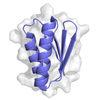[English] 日本語
 Yorodumi
Yorodumi- PDB-8wh7: Structure of hemagglutinin from Asiatic toad influenza-like virus -
+ Open data
Open data
- Basic information
Basic information
| Entry | Database: PDB / ID: 8wh7 | ||||||||||||||||||||||||
|---|---|---|---|---|---|---|---|---|---|---|---|---|---|---|---|---|---|---|---|---|---|---|---|---|---|
| Title | Structure of hemagglutinin from Asiatic toad influenza-like virus | ||||||||||||||||||||||||
 Components Components | Hemagglutinin | ||||||||||||||||||||||||
 Keywords Keywords | VIRAL PROTEIN / Hemagglutinin | ||||||||||||||||||||||||
| Function / homology | Haemagglutinin, influenzavirus B / Haemagglutinin / Haemagglutinin, influenzavirus A/B / host cell surface receptor binding / endocytosis involved in viral entry into host cell / fusion of virus membrane with host plasma membrane / viral envelope / membrane / Hemagglutinin Function and homology information Function and homology information | ||||||||||||||||||||||||
| Biological species |  Wuhan asiatic toad influenza virus Wuhan asiatic toad influenza virus | ||||||||||||||||||||||||
| Method | ELECTRON MICROSCOPY / single particle reconstruction / cryo EM / Resolution: 2.65 Å | ||||||||||||||||||||||||
 Authors Authors | Zhang, D. / Xie, Y.F. / Chai, Y. / Shi, Y. / Liu, W.J. / Qi, J.X. / Gao, G.F. / Gao, F. | ||||||||||||||||||||||||
| Funding support |  China, 1items China, 1items
| ||||||||||||||||||||||||
 Citation Citation |  Journal: To be published Journal: To be publishedTitle: Structure of hemagglutinin from Asiatic toad influenza-like virus Authors: Hao, T. / Xie, Y. / Chai, Y. / Zhang, W. / Zhang, D. / Qi, J. / Shi, Y. / Song, H. / Gao, G.F. | ||||||||||||||||||||||||
| History |
|
- Structure visualization
Structure visualization
| Structure viewer | Molecule:  Molmil Molmil Jmol/JSmol Jmol/JSmol |
|---|
- Downloads & links
Downloads & links
- Download
Download
| PDBx/mmCIF format |  8wh7.cif.gz 8wh7.cif.gz | 260.7 KB | Display |  PDBx/mmCIF format PDBx/mmCIF format |
|---|---|---|---|---|
| PDB format |  pdb8wh7.ent.gz pdb8wh7.ent.gz | 212.4 KB | Display |  PDB format PDB format |
| PDBx/mmJSON format |  8wh7.json.gz 8wh7.json.gz | Tree view |  PDBx/mmJSON format PDBx/mmJSON format | |
| Others |  Other downloads Other downloads |
-Validation report
| Arichive directory |  https://data.pdbj.org/pub/pdb/validation_reports/wh/8wh7 https://data.pdbj.org/pub/pdb/validation_reports/wh/8wh7 ftp://data.pdbj.org/pub/pdb/validation_reports/wh/8wh7 ftp://data.pdbj.org/pub/pdb/validation_reports/wh/8wh7 | HTTPS FTP |
|---|
-Related structure data
| Related structure data |  37532MC  8wisC  9w44C M: map data used to model this data C: citing same article ( |
|---|---|
| Similar structure data | Similarity search - Function & homology  F&H Search F&H Search |
- Links
Links
- Assembly
Assembly
| Deposited unit | 
|
|---|---|
| 1 |
|
- Components
Components
| #1: Protein | Mass: 54951.590 Da / Num. of mol.: 3 Source method: isolated from a genetically manipulated source Source: (gene. exp.)  Wuhan asiatic toad influenza virus / Production host: Wuhan asiatic toad influenza virus / Production host:  #2: Polysaccharide | Type: oligosaccharide / Mass: 1072.964 Da / Num. of mol.: 3 Source method: isolated from a genetically manipulated source #3: Polysaccharide | Source method: isolated from a genetically manipulated source #4: Sugar | ChemComp-NAG / Has ligand of interest | N | Has protein modification | Y | |
|---|
-Experimental details
-Experiment
| Experiment | Method: ELECTRON MICROSCOPY |
|---|---|
| EM experiment | Aggregation state: PARTICLE / 3D reconstruction method: single particle reconstruction |
- Sample preparation
Sample preparation
| Component | Name: Toad Hemagglutinin / Type: COMPLEX / Entity ID: #1 / Source: RECOMBINANT |
|---|---|
| Source (natural) | Organism:  Wuhan asiatic toad influenza virus Wuhan asiatic toad influenza virus |
| Source (recombinant) | Organism:  |
| Buffer solution | pH: 8 |
| Specimen | Embedding applied: NO / Shadowing applied: NO / Staining applied: NO / Vitrification applied: YES |
| Vitrification | Cryogen name: ETHANE |
- Electron microscopy imaging
Electron microscopy imaging
| Experimental equipment |  Model: Titan Krios / Image courtesy: FEI Company |
|---|---|
| Microscopy | Model: FEI TITAN KRIOS |
| Electron gun | Electron source:  FIELD EMISSION GUN / Accelerating voltage: 300 kV / Illumination mode: FLOOD BEAM FIELD EMISSION GUN / Accelerating voltage: 300 kV / Illumination mode: FLOOD BEAM |
| Electron lens | Mode: BRIGHT FIELD / Nominal defocus max: 2000 nm / Nominal defocus min: 1000 nm |
| Image recording | Electron dose: 49 e/Å2 / Film or detector model: FEI FALCON IV (4k x 4k) |
- Processing
Processing
| EM software | Name: PHENIX / Category: model refinement | ||||||||||||||||||||||||
|---|---|---|---|---|---|---|---|---|---|---|---|---|---|---|---|---|---|---|---|---|---|---|---|---|---|
| CTF correction | Type: PHASE FLIPPING AND AMPLITUDE CORRECTION | ||||||||||||||||||||||||
| 3D reconstruction | Resolution: 2.65 Å / Resolution method: FSC 0.143 CUT-OFF / Num. of particles: 1164981 / Symmetry type: POINT | ||||||||||||||||||||||||
| Refine LS restraints |
|
 Movie
Movie Controller
Controller




 PDBj
PDBj






